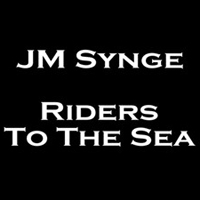Symbolism in Synge's Riders to the Sea
J.M. Synge's Riders to the Sea is embedded with many symbols highlighting the tragedy of the central character, Maurya. Most of the symbols are classic and typical suggesting the universal meanings. The careful and effective use of the symbolism has made the play the best tragedy of J.M. Synge.

The major symbol of the play is the sea, the source of life and at the same time the destroyer of the life. The people of the Island depend upon the sea for their survival by fishing. They collect sea weeds as a source of fuel. They have to cross the sea for the purchase of the goods and also for the selling of their productions. To make coffins also they have to go across the sea. The sea stands for the main source and the life for the Islanders, but meanwhile the same generous sea turns out to be destroyer and life taking agent. The sea is the natural force which can be violent and fierce at times. It has taken many lives of the islanders, including all the male members of Maurya’s family. She is left with her two daughters without any strong support for the financial provision. The sea is out of the prediction of the priest and even out of the control of the God. The Islanders believe that the sea tides refer to the birth and the declining sea tides refer to the death.
The Riders are another symbol of this play. The male members of the Island are all riders. They ride to the sea for the fishing and to support the family in their livelihood. They make adventures to the sea just to face death. Their defeat with the sea is the defeat of human being by the undefeated nature.
The use of the number nine is another powerful mythological symbol in the play. The number nine is used as a sign of bad luck in the play. There is no news of Michael for nine days, Maurya keeps weeping for her dead son for nine days and when Bartley died in the sea some nine unknown women come to Maurya.
The red mare of Bartley and the grey pony of Michael both stand for the death. Bartley sets off to the sea riding on the red mare and never comes back again. The bread Maurya made for Bartley is a symbol of life, but she cannot deliver it to him as he rides away fast and she cannot make equal pace for him. The result is Bartley is deprived of life and has to face death. The turning of the empty cup mouth downwards by Maurya is another important symbol in the play. This action suggests a failure of Christian comfort at the time of the demise of all the male members and shows the theme of infinite suffering and renunciation. This symbol also reinforces the theme of tragedy of old Maurya.
Riders to the Sea Study Center
Characterization of Maurya in Riders to the Sea
The Role of the Sea in Riders to the Sea
Circumstances of Bartley’s Death in Riders to the Sea
Biography of John Millington Synge
 |
bachelorandmaster.com |